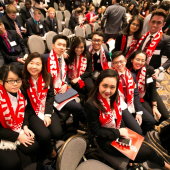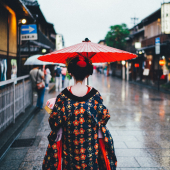Having a top quality education system as well as an attractive and diverse culture, Japan is the dream destination for many young international students. Join us in discovering the secrets to studying in Japan!
1. School
In Japan there are schools such as universities, colleges, vocational schools, Japanese language schools and more. Just like any popular destination, students are free to choose from a wide range of majors, like medicine, architecture, law, fine arts, music, fashion… the list goes on.
Students have access to learning with highly practical training programs, specialized skills and techniques to meet social needs. Moreover, you also have the opportunity to hunt attractive scholarships while studying at the school.
2. Transportation
Most Japanese people use electric trains as a means of transportation: They walk to the station, get on the train, get off the train and walk to school or work. Trams in Japan are very precise, and rarely late. On an average day, Japanese people spend 1 hour to 3 hours sitting on the train to go to school and work. In addition, you can buy bicycles in Japan to travel, which are commonplace and also very convenient.
3. Renting
The cost of renting a house in Japan is very high, especially in Tokyo, the most expensive city in Japan. So, before searching on your own, contact the school's international student office or the National and International Student Support Center to ask what type of accommodation is good. They will provide affordable accommodation for students and even support finding a home if you need it. For example, a budget room in Tokyo with a small area and shared toilet will cost about 40,000 yen / month.
4. Food and Drink
Japan is one of the most expensive countries in the world. You will want to save money and cook at home. Tap water, for example, is drinkable and a good way to save a little bit. Although most Japanese people think tap water is not good and often buy bottled water, the water system is very protected and refined.
Japan is the only country where you don't need to worry about going hungry, even in the middle of the night. Restaurants like Matsuya and Yoshinoya are open 24 hours, while convenience stores (kombini) and some supermarkets are also open 24 hours, sometimes even staying open during the holidays.
5. Living and Shopping
Japan has 100 yen shops, like Daiso, that have thousands of branches everywhere and a variety of products. Alternatively, you can go to the discounted area in Harajuku to shop.
Through AIEJ (Association of International Exchange), international students can get back a part of paid medical expenses, up to about 80%. For cases that are not on the national health insurance statistics list, you will have to pay for yourself.
Another incentive for students is that you can use the internet for free. Schools or cafes are places where you can get this service if you have registered a membership card.
6. Additional Employment
If you want to experience more when studying abroad, try your hand at various part-time jobs in Japan. You can find yourself a job like selling in a supermarket, serving at a restaurant, cafe, or newspaper stall. The extra wage is calculated by hour and area from 650 to 1200 yen / hour. You can refer to places where job offers are offered at the university to find the job that suits you best.
However, you must comply with the conditions set by the Japanese government when working part-time and avoid some improper circumstances, such as adult entertainment business, legal actions. prohibition laws etc.
You can work 4 hours per day but not more than 28 hours each week as a student. This is a regulation of the Japanese government to avoid excessive work that will affect student learning as well as limiting the case that students consider working more important than studying. If you are against the rules, you may be punished or expelled.
---
Hopefully, sharing these will help you have more useful information about studying in Japan. We wish you success on the journey to conquer your dream!










